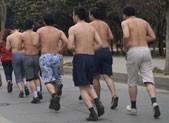
But despite the rising salaries, only about half of his workforce had returned by Tuesday.
Shen added that human resources staff have posted notices in websites and job agencies in Nanjing since last week to recruit enough workers and resume production by the end of February.
The demand for workers in Guangdong, a manufacturing hub in the country, grew by 15.2 percent year-on-year at the end of last year, and the demand will continue to rise in the short term with the expanding economy, according to the provincial human resources and social security department.
The peak shortage in the province is estimated at 1 million to 1.2 million workers.
The authorities in Guangdong are increasing minimum wages by 19.1 percent on average from May 1.
Minimum wages in Guangzhou will increase by 19.2 percent to 1,550 yuan a month and 15 yuan per hour.
Guangzhou will hold 100 job fairs, offering 300,000 jobs from 10,000 enterprises after the Spring Festival holidays till April, said Zhang Baoying, director of the Service Center of Guangzhou Human Resources Market.
Enterprises in the Yangtze River Delta region, they hope to more new workers and trying to prevent those in the current workforce from changing jobs.
"The labor shortage seems to be easing compared to the last two years. Some local enterprises shut down because of the weak economy, making more workers available for recruitment," said Yang Xiaolong, chairman of Zhejiang Gete Clothes Co Ltd in Wenzhou of East China's Zhejiang province.
About 200 previous workers in Gete have come back from their hometowns, and Yang has had to call up those unreturned management employees every day to ensure they will be back soon.
"I only can manage to guarantee that the majority of the senior workers will stay in positions with a steadily increasing salary," Yang said. The basic salary for a worker in his company is 2,500 yuan.

















 Employees run half-naked for not meeting sales quotas
Employees run half-naked for not meeting sales quotas


![]()
